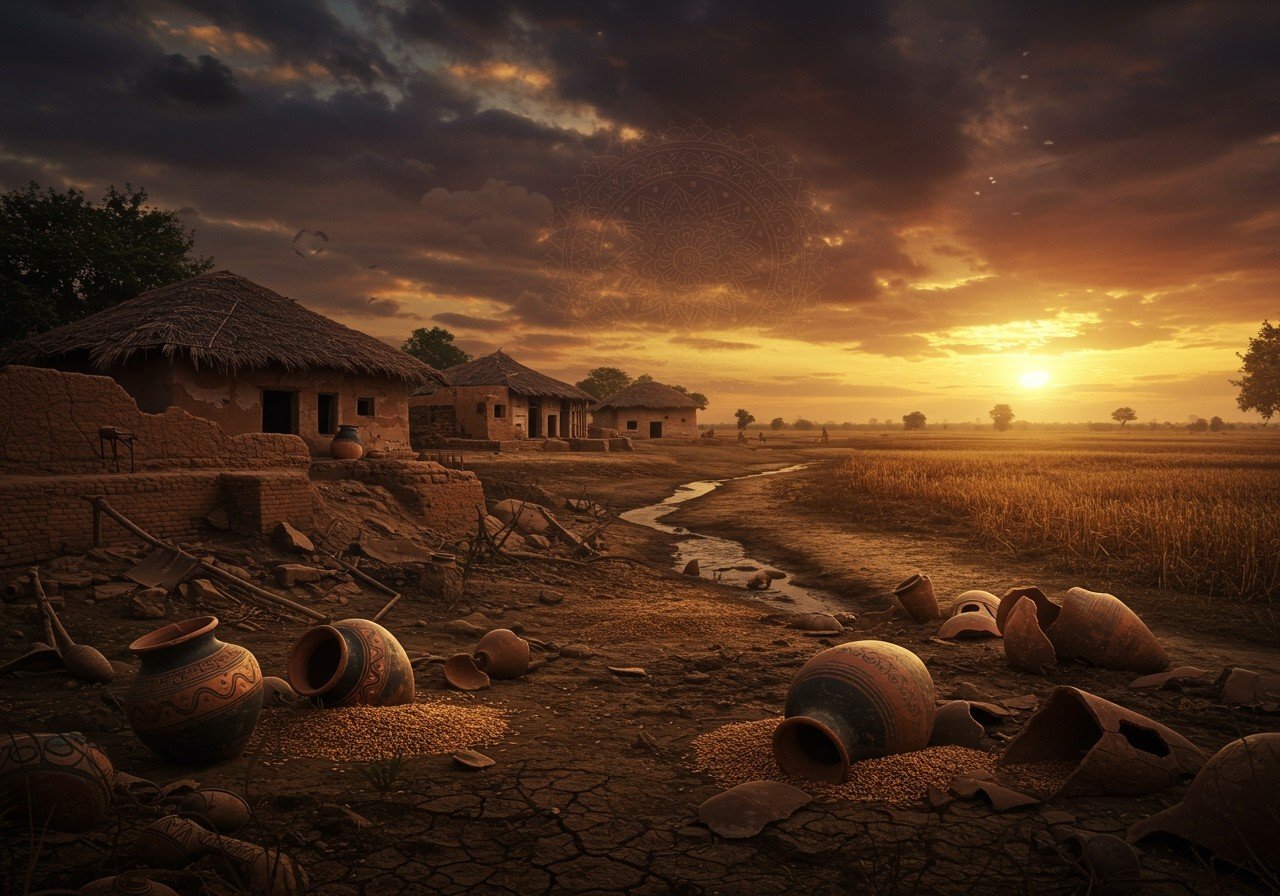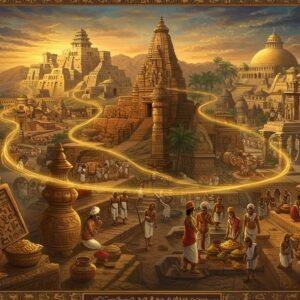
The Jorwe culture, a prominent Chalcolithic archaeological culture (approximately 1400-1000 BCE), thrived in the Deccan plateau of Maharashtra, India, and extended into parts of Madhya Pradesh. Known for its distinctive painted pottery, advanced agricultural practices, and unique burial customs, this civilization holds a significant place in India’s prehistory. However, the reasons behind its eventual decline remain a subject of ongoing research and debate.
Historical Background of the Jorwe Culture
Named after the type site of Jorwe, this culture distinguished itself through its refined pottery, often characterized by black-on-red designs and the use of coarse red or grey ware. The Jorwe people were skilled agriculturalists, implementing crop rotation techniques and cultivating barley, wheat, and pulses. Their settlements, often constructed with mud-brick houses, reflected a structured social organization. The unique burial customs, including urn burials, provide further insights into their beliefs and practices.
Recent Discoveries and Ongoing Research
Recent archaeological digs continue to unearth new information about the Jorwe culture. Discoveries at sites across Maharashtra are shedding light on the intricacies of their farming techniques, social structures, and daily life. Advanced technologies such as radiocarbon dating and DNA analysis are providing researchers with deeper insights into this ancient civilization. News outlets, including The Hindu, have highlighted these findings, underscoring the importance of continued research in unraveling the mysteries of the Jorwe culture.
Factors Contributing to the Decline
Several theories attempt to explain the decline of the Jorwe culture. Among these are:
- Environmental Shifts: Changes in climate, including prolonged droughts or floods, could have significantly impacted agricultural practices, leading to food shortages and societal instability.
- External Pressures: The arrival of new groups, either through migration or invasion, may have caused cultural changes, displacement, or conflict, disrupting the existing social order.
- Economic Transformations: Fluctuations in trade routes and economic systems could have weakened the Jorwe culture’s economic base, contributing to its decline.
- Internal Conflicts: Internal strife and shifts in political power dynamics within the Jorwe society could have destabilized the culture, leading to its fragmentation and eventual collapse.
The Significance of Navdatoli
Navdatoli, a crucial archaeological site located on the banks of the Narmada River, holds significant importance in understanding the Jorwe culture. Excavations at this site have revealed valuable information about the Jorwe people’s daily lives, including their pottery styles, tools, and agricultural methods. The evidence of planned settlements and social structures further enriches our understanding of this civilization.
Comparative Analysis with Other Cultures
Comparing the Jorwe culture with contemporary civilizations, such as the Harappan civilization and the Chalcolithic cultures of South India, offers a valuable perspective. Analyzing their social structures, economic practices, and environmental adaptations can provide insights into the specific challenges faced by the Jorwe people and the factors that ultimately led to their decline.
Preserving India’s Cultural Heritage
Understanding the decline of the Jorwe culture offers valuable lessons about societal resilience and adaptation. It also underscores the importance of preserving our rich cultural heritage. As research continues, we gain a deeper appreciation for the contributions of the Jorwe people to India’s history.
FAQs on the Jorwe Culture
What was the Jorwe culture? The Jorwe culture was a Chalcolithic archaeological culture, existing approximately between 1400-1000 BCE in Maharashtra, India, and parts of Madhya Pradesh. It is known for its distinct painted pottery, agricultural practices, and unique burial customs.
Where was it located? Primarily in the Deccan region of Maharashtra, India, with some extension into Madhya Pradesh. Key sites include Jorwe and Navdatoli.
What are some key features of their pottery? Jorwe pottery is notable for its black-on-red designs, as well as the use of coarse red or grey ware. Forms include jars, bowls, and spouted vessels.
What led to its decline? Several factors are theorized, including environmental changes, external pressures from migrating or invading groups, economic shifts, and internal conflicts.
What is the significance of Navdatoli? Navdatoli is a key archaeological site providing valuable insights into Jorwe life, including settlement patterns, pottery, tools, and agricultural practices.
Connect with Your Heritage at Poojn.in
The story of the Jorwe culture reminds us of the importance of cherishing and preserving our traditions. At Poojn.in, India’s leading online store for cultural and religious goods, we offer a wide selection of authentic puja items to help you connect with your heritage.
- Puja Items for Every Occasion: Explore our extensive collection of traditional puja thalis, diyas, incense, and more to enhance your spiritual practices. We offer everything you need for daily worship, festivals, and special ceremonies. Our products are crafted with utmost care and reverence, ensuring authenticity and quality.
- Sacred Items for Worship: Discover a wide range of murtis, yantra, and religious texts to deepen your connection with the divine. From deities like Lord Shiva and Vishnu to essential ritual items, we have everything to support your spiritual journey.
Visit Poojn.in today and explore our diverse collection. We deliver across India, bringing the sanctity of tradition to your doorstep.
Further explore related topics on our blog:
- Saptashrungi Devi: Legend, Myths, Stories, and Beliefs
- Ancient Shiva Temples of Maharashtra: A Journey Through Time


